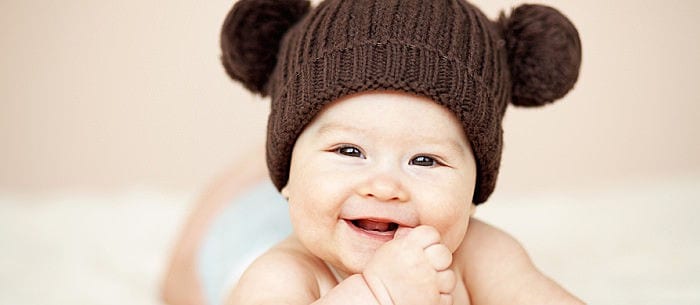The first three months of your baby’s life goes by in a whirlwind of dirty diapers, snuggles and sleepless nights. In 12 short weeks, he has come a long way from being a sleepy, tiny newborn and has likely met many of his 3-month-old milestones.
As parents, clocking plenty of face-to-face time with your baby is important to his social and sensory development. According to Nicole Beurkens, Ph.D., a pediatric clinical psychologist at Horizons Developmental Resource Center, “Babies start developing foundations for social and communication development during these early months, so continue talking to your baby, smiling and making facial expressions.”
As he gradually becomes more aware of his surroundings and begins to imitate sounds, he’s gaining skills that will soon lead to that first “mama” or “dada.” No longer just making reflexive, involuntary movements, your baby is starting to move with a purpose as he works on the skills and strength he’ll need to crawl across the floor. Provide ample opportunity for tummy time to help him develop muscle strength and coordination while he moves toward his physical milestones.
Keep in mind milestones are guidelines for parents. “Every child is unique, and there is a wide age range for milestones that is considered normal,” says Dr. Richard So, M.D., pediatrician and clinical assistant professor at Cleveland Clinic Children’s Department of Community Pediatrics.
The American Academy of Pediatrics provides the following list of 3-month-old milestones that your baby may be reaching:
And read our guide to developmental milestones for kids.
Physical Milestones
- Grasps and shakes hand toys
- Holds head and chest up when on stomach
- Moves hands to mouth
- Opens and closes hands
- Pushes down on legs when feet touch firm surfaces
- Reaches at dangling objects with hands
- Stretches legs and kicks when on stomach or back
- Supports upper body with arms while on stomach
Read more about physical milestones for 3 month olds.
Sensory Milestones
- Begins to babble
- Begins to imitate sounds
- Develops hand-eye coordination
- Looks toward direction of sounds
- Recognizes familiar people or objects from a distance
- Smiles at familiar voices
- Tracks moving objects
- Watches faces intently
Learn more about sensory milestones for 3 month olds.
Social Milestones
- Begins to have a social smile
- Enjoys playing with other people and may cry when playing stops
- Imitates some facial expression and movements
- Is increasingly expressive and communicative with his face and body
Check out these social milestones for 3 month olds.
Milestone Guidelines
“The milestones list represents the earliest you can typically expect to see a behavior, but it can be deceiving to parents who see it as a strict set of rules,” says Dr. So. “Pediatricians look at the baby as a whole — not just a singular milestone — and use the list to inform their physical exam, determine if there is a concern and refer to a specialist as needed.” While it’s natural to be concerned if your child is not meeting milestones, keep in mind that they happen on a spectrum, they are not linear, and — occasionally — babies even skip certain milestones. For instance, some may skip crawling in favor of walking. Dr. So reminds parents not to skip any well-child visits, as they are designed to track your child’s development and catch any delays so your child can receive early intervention. And if you have any concerns in between visits, always check in with your pediatrician.
Victoria Georgoff is a freelance writer and psychotherapist who enjoys writing about parenting, helping other parents, and of course, being a parent herself.
* This article is for general informational purposes only. It is not intended nor implied to be providing medical advice and is not a substitute for such advice. The reader should always consult a health care provider concerning any medical condition or treatment plan. Neither Care.com nor the author assumes any responsibility or liability with respect to use of any information contained herein.






